Marine fish diseases are as common as those in freshwater but can also be more deadly and costly.
Marine fish are not cheap and you’ll need to do all you can to prevent diseases from getting into your tank.
Make sure you closely look over any new fish for signs of disease and quarantine them, if you can, before adding them to your tank.
Table of Contents
Common Marine Fish Diseases
Let’s take a look at the five most common marine fish diseases.
Ich
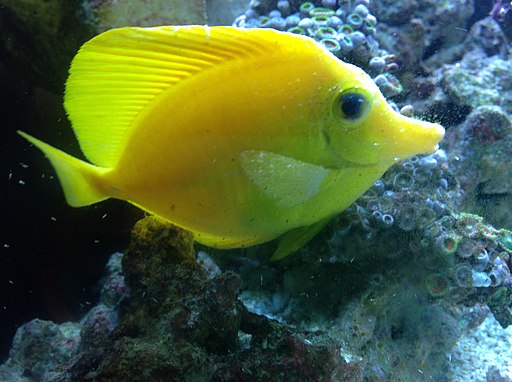
Ich or Whitespot is the most common marine fish disease and the most easy to spot. Small salt-grain-sized spots appear on the fish, usually on the fins first.
These spots can spread rapidly across the fish’s body and can be fatal if the gills are infected and it will spread throughout the tank if untreated.
Symptoms include white spots on the fins and body, flashing or scratching on the sand or rocks, and rapid breathing
Note: If you can count the spots on the fish then it has Ich. If the sports are too numerous to count, it is more likely that the fish have Velvet, which is far more serious.
Treatments are Copper-based medications, Chloroquine Phosphate and Hyposalinity. All of these are harmful to any invertebrates or corals and will require a separate quarantine tank to treat the fish.
Velvet
Marine Velvet is a severe and deadly disease that can wipe out all the inhabitants of a tank in a 24-48 hours period. Any fish showing symptoms should be quarantined immediately.
If white spots appear that are too numerous to count then the fish has velvet.
Treatments are the same as for Ich and require a separate quarantine tank to treat the fish.
Brooklynella
Brooklynella is often referred to as Clown Fish Disease because it is common among imported wild clown fish. However, other fish can just as easily become infected.
Symptoms are a web-like white film on fish or white blotches on non-clownfish.
As with velvet, this disease is deadly to your fish and can kill them in a matter of hours to days. Treatment should be immediate and requires a separate quarantine tank to treat the fish.
Treatments include using a freshwater dip initially and then using a Formaldehyde solution.
Flukes
Flukes are a hidden parasite that live inside a fish’s gills or skin.
Symptoms include lethargy and reddened fins, fish losing weight, or clear faeces. Scratching behavior without signs of white spot may indicate marine skin flukes.
Treatments include a freshwater dip and then using an Anti-Fluke solution.
Black Ich
Black Ich, as you would expect, is similar to Ich but with black spots instead of white. It usually affects Tangs and symptoms and treatments are the same as for Ich.
Marine Fish Disease Prevention
Prevention is always better than cure so here are some of the things you can do to stop your marine fish from getting diseases in the first place.
Quarantine New Fish
Set up a quarantine tank and add any new fish to that first. That way you can be sure they are healthy and 100% disease-free before adding them to your main tank.
If any new fish do show signs of disease you can treat them in the quarantine tank safe in the knowledge that any harmful elements in the medication will not impact your main tank.
See our article, How to Set Up a Quarantine Fish Tank for more information.
Good Diet
The best way for your fish to fight off any diseases is to be healthy in the first place and that starts with a good diet.
A well-balanced and species-appropriate diet should at least include both flakes and top-quality frozen foods but you should also think about using a vitamin additive.
These can significantly improve the vitality of fish and increase their resistance to stress and susceptibility to disease.
We use the following:-
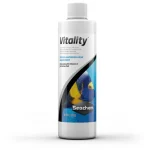 | Seachem Vitality | Check pricing on eBay >> *Free UK Delivery |
Good Water Quality
Always use RO water in your tank and top-ups to ensure that your tank water is free from outside contaminants that may be present in tap water.
Regularly test your water with a good saltwater test kit to ensure it is kept pristine and is the best environment for your fish.
Marine Fish Treatments
Important Note: Most marine fish treatments will utilise chelated copper or other chemicals which are harmful to any corals, invertebrates (shrimp, snails, etc), or live rock that are present.
Therefore, diseased fish should be removed and placed in a dedicated quarantine tank for treatment.
Be sure to follow all instructions carefully and do not overdose.
The following specially formulated treatments will deal with the most common marine fish diseases:-
Ich, Velvet and Black Ich
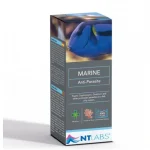 | NT Labs Marine Anti-Parasite | Check pricing on eBay >> *Free UK Delivery |
Brooklynella
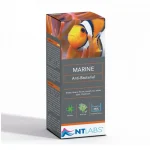 | NT Labs Marine Anti-Bacterial | Check pricing on eBay >> *Free UK Delivery |
Flukes
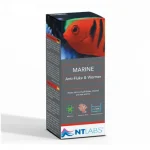 | NT Labs Marine Anti-Fluke | Check pricing on eBay >> *Free UK Delivery |
Marine Fish Diseases and Treatments FAQs
How do you treat a sick marine fish? – The best way to treat sick marine fish is to remove them and place them in a quarantine tank. Copper-based and other treatments for marine fish can be harmful to any corals and invertebrates you may have in your main tank.
How can you tell the difference between a marine fish velvet and ICH? – Ich is identified by small salt-grain-sized spots on the fish. At first, velvet may look similar but If the sports are too numerous to count, it is more likely that the fish have Velvet.
What kills marine Velvet? – A treatment in a Chloroquine Phosphate solution will kill marine velvet provided the treatment is applied quickly. Isolate any sick fish in a quarantine tank first before adding the solution.
Can saltwater fish survive ich? – Yes, provided they are treated promptly. Treatments are Copper-based medications, Chloroquine Phosphate, and hypersalinity, ideally applied in a separate quarantine tank.
A good diet should be of both flakes and top-quality frozen foods and the addition of a vitamin additive will help your fish fight ich and other diseases.
